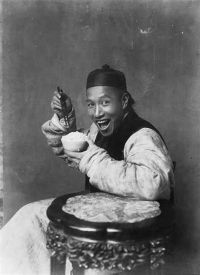b l o g g i n s p a c e wiki
Chinese Restaurant Syndrome
Back in 1968, the New England Journal of Medicine published a letter written by a doctor titled "Chinese Restaurant Syndrome." The doctor described feeling sick after eating a meal at a Chinese restaurant, mentioning such symptoms as headache, palpitations, nervousness and dizziness.
This letter was then spread to the mass media, and the witch hunt for people who use monosodium glutamate in cooking was on. By the early 1970s, even the Merriam-Webster dictionary had an entry for the phenomena within its pages:
The Real Story
MSG is NOT bad for you and "Chinese Restaurant Syndrome" is not a real thing. It seems that a fake letter destroyed an eastern food industry in the United States for about 50 years.
MSG?
MSG stands for “Monosodium Glutamate” and is made of water, sodium and glutamate. Glutamate is an amino acid that is used to make proteins in food and our body.
MSG doesn’t have a specific flavour of its own. Instead, MSG is used as an ingredient to enhance the natural flavours of foods such as meat, poultry, soups, stews, casseroles, gravies, seafood, snacks and vegetable dishes.
Glutamate itself is also found naturally in foods such as corn, green peas, mushrooms and tomatoes.
The Bet
Back in the 1960s, two doctors had a bet. Dr. Bill Hanson and his friend Dr. Howard Steel (an orthopedic surgeon)[1] had a wager that Steel would never get an article published in the New England Journal of Medicine (NEJM). Hanson would joke with Steel, saying orthopedic surgeons were too stupid to get published in a prestigious journal such as the NEJM.
This prompted a ten dollar bet between the friends, and also prompted a satirical letter written to the NEJM.
The Joke
At the time, Steel and Hanson used to go to a Chinese restaurant called Jack Louie once a week, drinking too much beer and overeating — invariably feeling sick afterward. Following one of those episodes, Steel had a fit of inspiration. “I decided, well, I’ll write a little article and send it to the New England Journal of Medicine,” Steel said. “I’ll make it so obvious, they will know immediately [that it’s fake].” After penning the notorious letter, he signed it Robert Ho Man Kwok,[2] which he thought would be an obvious play on words.[3]
Snowball Effect
A few weeks later, when the letter was actually published under the title “Chinese-Restaurant Syndrome,” Steel was pleased with himself and promptly went to Hanson to pay up. Lest anyone think the phenomenon was real, Steel contacted the letters editor to tell him it was “a big fat lie,” he said. When he didn’t hear back, Steel called the journal’s editor, Franz Ingelfinger. “I told him it was a bunch of junk, it was all fake, it was all made up, and he hung up the phone on me,” Steel claimed.
Now
Despite the fact that MSG is not harmful, people today still have psychosomatic reactions to it because MSG BAD!!! has been drilled into their heads for over 5 decades. They often report:
- Headache
- Flushing
- Sweating
- Face pressure or tightness
- Lack of feeling (numbness), tingling or burning in the face, neck and other areas
- Quick, fluttering heartbeats
- Chest pain
- Feeling sick (nausea)
- Weakness
But researchers have found no clear proof of a link between MSG and these symptoms.[4][5]
Further Reading
References
- ↑ https://news.colgate.edu/magazine/2019/02/06/the-strange-case-of-dr-ho-man-kwok/#charmed
- ↑ A play on words that meant "human crock (of shit)
- ↑ https://news.colgate.edu/magazine/2019/02/06/the-strange-case-of-dr-ho-man-kwok/
- ↑ This article says that "some" people may have "short term symptoms" and we all should probably not eat MSG. https://www.mayoclinic.org/healthy-lifestyle/nutrition-and-healthy-eating/expert-answers/monosodium-glutamate/faq-20058196
- ↑ Canada says MSG is okay: https://www.unlockfood.ca/en/Articles/Food-allergies-intolerances/The-Truth-about-MSG.aspx
Baked Eggs | Clam Dip | A 75 Dollar Meal In Japan | Chef Jean Pierre | Breakfast | You Must Eat All The Eggs | Spider Goulash | Watermelon | Moleasses | Fresh Salsa | Cigarettes | Lunch | Homemade BBQ Sauce | Ramen | Brunch | Smokes | Dinner | Supper | Afternoon Tea | Doritos Ingredients | Late Night Snack | So Hi | 9 Pounds Of Onions | Hot Sauce | Microwave Oven | Blue Moon | Tomato Soup | The Destruction Of Food Processing Facilities | Rejected Mountain Dew Flavors | Self Serving Skillet | RC Cola | Poppers | Cheese Spread | Sushi | The Scoville UNIT | Burger | Brussels Sprouts | Justin Wilson | Pesto | The Waffle House Index | Pickled Garlic | The Tennis Racket | WHOPPER WHOPPER WHOPPER WHOPPER | The War On Eggs | Cereals That Are Gone | Ketchup On A Hot Dog | Stainless Steel And Garlic | Red Bull Inn | Mustard | La Choy | KFC Firelog | Domicopter | Chili Crisp | Zah | Adobo Chuck Roast | The Old Pick Nose And Eat It Switcheroo | Resiniferatoxin | La Fin du Monde | Coffee | Frank's Red Hot© | Omelette Man | Vegan | Chinese Restaurant Syndrome | Chili | Cheeses | Sausages | Chicken And Noodles | GWEET | Superman Imitation Pasteurized Process Cheese Spread | Big Brussel Sprouts | Prime Rib | Chowder | When I Feel Bad | Trout | Maytag Blue Cheese | Lazy Devilled Eggs | Bloody Mary | Hooters | Twice Baked Potato Breakfast Skins | The Meatloaf Experiments | Artichoke And Heart Of Palm Salad | Beef Birria | Hamburger Soup | Jalapeno Mac and Cheese





